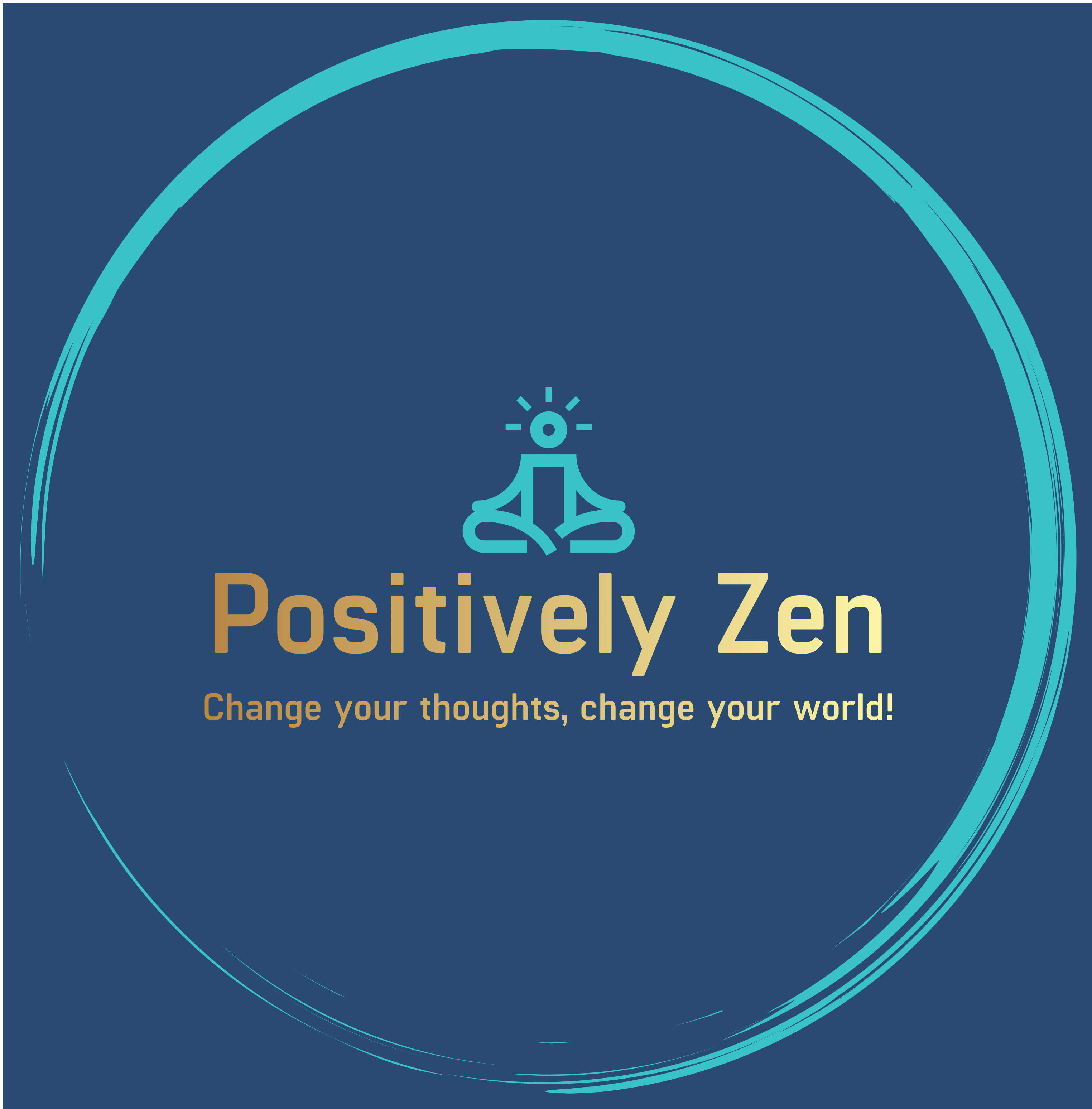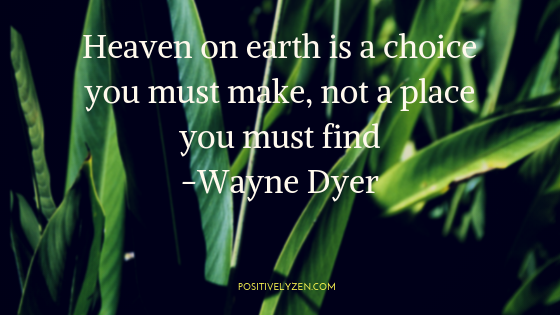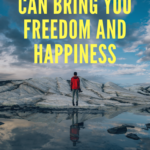How Detaching Can Bring You Freedom and Happiness
Defining Detachment
Detachment is “freedom from bias or prejudice; aloofness”, as defined by Merriam-Webster. I don’t want to be aloof, and I don’t want you to be either! “Freedom from bias or prejudice” is where I believe the power is held here. Who wouldn’t want to have a mind that is free? To know that your joy doesn’t come from any earthly thing or outcome is to know true freedom of the mind. Not holding bias, being objective and open, frees you from judging others and from being offended. How easily is everyone offended these days?! Detaching is a life-changing tool of the mind to possess!
Take no offense. That which offends you only weakens you. Being offended creates the same destructive energy that offended you in the first place-so transcend your ego and stay in peace. -Wayne Dyer
Detaching from an outcome is different than detaching from relationships, experiences, and life overall. It means that you can enjoy each moment more freely, not dreading or depending on any outcome to determine your happiness. You can walk through life with confidence and lightness that comes with not attaching your happiness to things or circumstances.
Why We Attach
The easiest answer is happiness. Why do we buy new things or seek new relationships, careers, and dreams? Ultimately it’s because we think it will make us happier in some way. Will it though? And should it? If your happiness is found in other people, outcomes and things, then your happiness can easily vanish.
The ability to know that your worth and happiness doesn’t depend solely on outcomes and people/things outside of you is so vital! When you detach, you can objectively step “outside” of a situation to process and reflect, rather than react and be consumed at that moment. You can be fully grounded regardless of each new situation that arises.
What Are We Attached To?
You may already have some people or things in mind that you know you’re attached to. We’re all attached in various ways to things and people that are closest to us. These generally help define who you are as a person. How many things define us though?! I’m defined by being a mom, daughter, pharmacist, writer, swimmer, nature lover and on and on. I will still remain me even if any of these defining things are lost, however. I will be changed and different and grow in the face of losing any, but I’ll still be me. This is an important realization, and often somewhat intimidating.
There is one thing that defines me and I’m attached to that is grounding and unchanging. Being a child of God is where my hope, faith, and worth are found. Finding attachment in this area is the one that brings true freedom, for me. You may have similar beliefs or a completely different religion, or something else that brings a constant, unchanging grounding for you. Tune in to this, in whatever realm it is for you, this love that connects us all is universal and unchanging.
The best and most beautiful things in this world cannot be seen or even heard, but must be felt with the heart -Helen Keller
How Being Attached Affects Us
Being completely attached to a relationship, occupation, dream, person or thing can make you feel incomplete without it. This is huge for our mental health and can cause many different emotions that not only affect us mentally but sometimes physically as well. Here are just a few:
- Worry/fear
- Depression
- Anxiety
- Helplessness
- Pride
- Insomnia
How To Detach: 3 Simple Steps
1.) Observe Objectively
Start taking note of when you get upset or are worrying and anxious about a person or potential outcome. Take a step back and observe how being attached to an outcome, is causing you an emotional and/or physical stress. You’ll begin to see what your triggers are, and can then learn to be more objective in these areas. Stress happens when life is happening differently than we think it should be. When life isn’t our version of perfect, it’s easy to be swayed into chaos. Being able to step back and process life as it’s happening, and then respond rather than react, is key here.
I use the example of my daughter’s behavior a lot in reference to stepping back to observe objectively. Her behavior is so different than mine and almost foreign to me in how to process it. In the heat of the moment, it’s easy to get really frustrated and unhappy with not being able to control her as I’d like. That’s when I need to step back though. There’s only so much you can do in guiding someone to do the right thing. Seeing that your strength isn’t in being able to control someone else, but rather in how you respond to them is integral. You can’t fully control anyone or anything outside of yourself. You can control your responses and actions, that’s where the virtue lies.
2.) Accept and Act
Accepting life as it happens doesn’t mean you’re giving in or up on anything. It’s knowing that it’s ok when things don’t go your way. It’s finding peace in the present and knowing you can take action to make it better in some way. Be able to accept outcomes and people when they are different than what you expected. Know that this isn’t the end, even if it feels like it is.
Action is the solution for your distress in so many ways! Get a bad grade? Come up with a study plan to get back on track. Receive a difficult diagnosis? Make a doctor appointment to clarify your path and next steps, reach out to a help group or a loved one for support. When you are consumed by worry, write down a list of things to do that can improve your current situation or bring comfort in some way. This simple task brings the mind much-needed relief. Taking action takes you on the road to improving your situation. Even if you can’t see the end at the time, you only need to start and before you know it you’ll be closer to where you want to be.
3.) Self Care to Sustain
Changing old habits and the way you process your thoughts can take a lot of focus and redirection in the beginning. In order for you to be primed for success, you have to take care of you! Self-care can be as simple as beginning with a 5-minute daily dedicated time for yourself. It can be exercise, healthy eating, drinking plenty of water, meditation, prayer, journaling, being in nature; self-care can be so many different things to each person. Whichever self-care practice helps you to refocus, breathe deeply, let old habits and negative thinking drift away, start doing at least one thing every day to accomplish this.
Sustaining yourself through these daily practices helps you recognize, and be in tune with, areas of your mind and life that need working on. If you’re running on empty all the time, you tend to be more likely to be attached to things outside of yourself to determine your happiness. When you have a calm center and are connected through your inner soul first, you won’t be looking for others to validate you or provide your happiness.
Freedom & Happiness
Find your freedom in connecting internally first. Happiness starts within you when you’re connected and grounded with the source that connects us all. Don’t give anyone or anything the power to determine your mood, happiness, and joy. You are so much more than what surrounds you! Start today and be free. Don’t be discouraged if you notice yourself back in old thinking and habits either! We are all human, and it’s ok to feel and process our emotions. Remember, we’re not trying to detach from relationships and life in general, but from outcomes beyond our control. Happiness comes from continual choices and connection, it’s an ongoing practice.
As always, feel free to email me at hannahallison@positivelyzen.com with any questions or concerns! Cheers to a zen mind and life!


